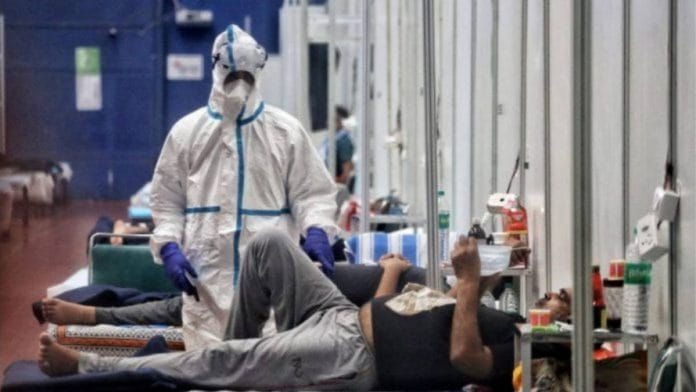New Delhi: The longest follow-up study till date among Covid patients who were hopitalised with the infection shows that about 55 per cent of them still have at least one symptom — fatigue, shortness of breath or sleep difficulties — according to a report published in The Lancet Respiratory Medicine Thursday.
The study followed up with 1,192 participants in China who had been infected with SARS-CoV-2 during the first phase of the pandemic (between 7 January and 29 May, 2020) at six months, 12 months, and two years after recovery. It was carried out by researchers from the China-Japan Friendship Hospital in Beijing, Tsinghua University School of Medicine, and the Chinese Academy of Medical Sciences.
Both the long-term health outcomes of hospitalised Covid-19 survivors, and the specific health impacts of long Covid, were analysed.
While physical and mental health generally improved over time, the analysis suggests that recovered Covid-19 patients still tend to have poorer health and quality of life compared to the general population.
The long-term health impacts of Covid-19 have remained largely unknown, as the longest follow-up studies so far have spanned around one year.
“Our findings indicate that for a certain proportion of hospitalised Covid-19 survivors, while they may have cleared the initial infection, more than two years is needed to recover fully from Covid-19,” lead author Bin Cao, of the China-Japan Friendship Hospital, said in a statement Thursday.
He added: “Ongoing follow-up of Covid-19 survivors, particularly those with symptoms of long Covid, is essential to understand the longer course of the illness, as is further exploration of the benefits of rehabilitation programmes for recovery.”
“There is a clear need to provide continued support to a significant proportion of people who’ve had Covid-19, and to understand how vaccines, emerging treatments, and variants affect long-term health outcomes,” Cao said.
Also read: Drug patented in 1960s can halve recovery time in mild & moderate Covid cases, study finds
Poorer quality of life
The researchers evaluated the health of 1,192 participants who had been treated for acute Covid-19 at the Jin Yin-tan Hospital in Wuhan, China.
Assessments involved a six-minute walking test, laboratory tests, and questionnaires on symptoms, mental health, health-related quality of life, whether they had returned to work, and healthcare used after discharge.
The negative effects of long Covid on quality of life, exercise capacity, mental health, and healthcare use were determined by comparing participants with and without long Covid symptoms. Health outcomes at two years were determined using an age, sex, and comorbidities-matched control group of people in the general population, with no history of Covid-19 infection.
Six months after initially falling ill, 68 per cent of participants reported at least one long Covid symptom. By two years after infection, reports of symptoms had fallen to 55 per cent. Fatigue or muscle weakness were the symptoms most often reported and fell from 52 per cent at six months to 30 per cent at two years.
Regardless of the severity of their initial illness, 89 per cent of participants had returned to their original work at two years.
Two years after initially falling ill, patients with Covid-19 are generally in poorer health than the general population, with 31 per cent reporting fatigue or muscle weakness and 31 per cent reporting sleep difficulties, found the study.
The proportion of non-Covid-19 participants reporting these symptoms was five per cent and 14 per cent respectively.
Covid-19 patients were also more likely to report a number of other symptoms, including joint pain, palpitations, dizziness, and headaches. Covid-19 patients also more often reported pain or discomfort and anxiety or depression than non-Covid-19 participants. As many as 35 per cent reported pain or discomfort and 19 per cent reported anxiety or depression.
Around half of the participants had symptoms of long Covid at two years, and reported poorer quality of life than those without long Covid.
(Edited by Poulomi Banerjee)
Also read: In rebuttal to WHO, Modi govt claimed 99.9% deaths registered. NFHS-5 pegs 2019-21 figure at 71%






